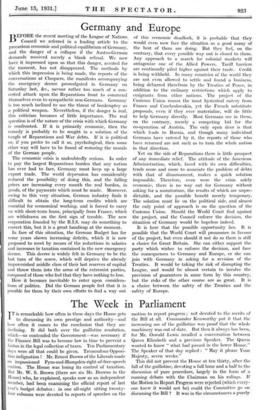Germany and Europe
BEFORE the recent meeting of the League of Nations, Council we referred in a leading article to the precarious economic and political equilibrium of Germany, and the danger of a collapse if the Austro-German demands received merely a blank refusal. We now have it impressed upon us that this danger, averted for the moment, has not disappeared. The methods by which this impression is being made, the reports of the conversations at Chequers, the manifesto accompanying the emergency decree promulgated in Germany on Saturday last, &c., savour rather too much of a con- certed attack upon the Reparations front to commend themselves even to sympathetic non-Germans. Germany is too much inclined to use the threat of bankruptcy as a political weapon. Nevertheless, if the danger is real, this criticism becomes of little importance. The real question is of the nature of the crisis with which Germany is confronted. If it is primarily economic, then the remedy is probably to be sought in a solution of the tangle of Reparations and War debts. If it is political or, if you prefer to call it so, psychological, then some other way will have to be found of restoring the morale of the German people.
The economic crisis is undoubtedly serious. In order to pay the largest Reparations burden that any nation has ever had to face, *Germany must keep up a large export trade. The world depression has considerably reduced the possibility of doing this, and the falling prices are increasing every month the real burden, in goods, of the payments which must be made. Moreover, owing to this very situation, German industry finds it difficult to obtain the long-term credits which are essential for economical working, and is forced to carry on with short-term loans, principally from France, which are withdrawn on the first sign of trouble. The new corporation founded by the B.I.S. may do something to correct this, but it is a great handicap at the moment.
In face of this situation, the German Budget has for some years shown increasing deficits, which it is now proposed to meet by means of the reductions in salaries and increases in taxation contained in the new emergency decree. This decree is widely felt in Germany to be the last turn of the screw, which will deprive the already impoverished middle class of their last reserves of capital and throw them into the arms of the extremist parties, composed of those who feel that they have nothing to lose.
Here it becomes inevitable to enter upon considera- tions of politics. Did the German people feel that it is possible for them by their own efforts to find a way out of this economic deadlock, it is probable that they would even now face the situation as a good many of the best of them are doing. But they feel, on the contrary, that every possible way out is closed to them. Any approach to a search for colonial markets will antagonize one of the Allied Powers. Tariff barriers are continually piled higher against their trade. Credit is being withheld. In many countries of the world they are not even allowed to settle and found a business, being debarred therefrom by the Treaties of Peace, in addition to the ordinary restrictions which apply to emigrants from other nations. The project of the Customs Union rouses the most hysterical outcry from France and Czechoslovakia, yet the French substitute proposals, even if they ever materialize, will do little to help Germany directly. Most Germans see in them, on the contrary, merely a competing bid for the co-operation of Austria. The only open door is that which leads to Russia, and though many individual Germans have entered by it, the reports of those who have returned are not such as to turn the whole nation in that direction.
Yet on the side of Reparations there is little prospect of any immediate relief. The attitude of the American Administration, which, faced with its own difficulties, tends more and more to associate the problem of debts with that of disarmament, makes a quick solution impossible. Therefore, even were the crisis solely economic, there is no way out for Germany without asking for a moratorium, the results of which are unpre- dictable, and the possible benefit merely temporary. The solution must lie on the political side, and almost the only point of approach is on the question of the Customs Union. Should the World Court find against the project, and the Council enforce the decision, the situation of Germany would be hopeless indeed.
It is here that the possible opportunity lies. It is possible that the World Court will pronounce in favou r of the project, but even should it not do so there is still a choice for Great Britain. She can either support the party which wishes to enforce the decision, and face the consequences to Germany and Europe, or she can join 'with Germany in asking for a revision of the Treaties. It would be taking the risk of disrupting the League, and would be almost certain to involve the provision of guarantees in some form by this country, but the risks of the other course are as great. It is a choice between the safety of the Treaties and the safety of Europe.






































 Previous page
Previous page